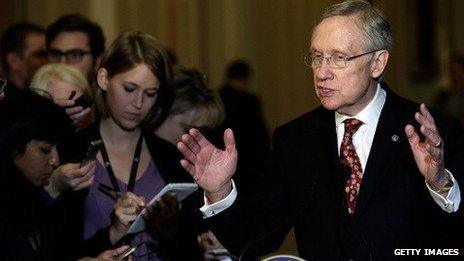US Senate's 'nuclear option' triggers fierce debate
- Published
- comments

For the first time since 1975, the US Senate has made a major change to the rules by which it will vote on nominations to executive and lower-level judicial positions. Instead of a two-thirds majority, the Senate will only require a simple majority vote to approve a nominee.
It is a move that has been talked about and threatened for years, as political nominees from both parties have seen their job ambitions thwarted by an unco-operative minority in the Senate.
Initial reaction on both sides of the political divide is one of surprise:
"What is happening now is a rare change to the Senate rules, the consequences of which for the Senate, this president, the presidency and the future remain very uncertain," writes Talking Points Memo's David Kurtz, external.
"The Senate can start functioning again," writes Joan McCarter, external for the liberal Daily Kos. "At least on nominations."
She goes on to write: "This will likely just further enrage Republicans, making them even more obnoxious and obstructionist."
So, is there conservative rage? Yes.
"For Harry Reid and President Obama, this is not about a couple of circuit court judges; this is an attempt to remake America to reflect their unworkable and unpopular progressive vision," said Michael Needham, external, head of Heritage Action.
"If Reid and his colleagues continue down this path, they will set a precedent that fundamentally alters the role of the minority in American politics."
And obstructionism? The Ace of Spades HQ blog lays it out, external:
"This is going to result in all-out partisan warfare in the Senate," DrewM writes. "Democrats complain filibusters slow the Senate down but requiring a vote on everything and not agreeing to any unanimous consent requests will grind it to a halt."
Paul Waldman of the American Prospect argues, external that all Democrats did today was beat Republicans to the punch: "You can make an argument that Democrats should have taken the high road and not changed the filibuster rule today. But if you think Republicans wouldn't have changed the rule to benefit themselves at the first chance they got - no matter what Democrats did - then you haven't been paying attention."
Jennifer Rubin, a blogger for the Washington Post, writes, external about what she sees as President Obama and the Democrats' real motive behind this move: "The president is now desperate to hold onto his base, so socking it to the GOP is more important than ever, as is even a temporary distraction from the Obamacare fiasco."
She is, however, philosophical about the move:
My suggestion to Republicans is to move on and, unfortunately, return the "favor" when they are in power. Republicans are not blameless in this. First, you have to win elections both at the presidential level and in the Senate. The people screaming the loudest on the right are also those who have backed some of the worst, most self-destructive candidates out there. So, start picking candidates wisely and winning elections. And second, the filibuster threat was arguably meant to be used sparingly. (The "extraordinary circumstances" standard was the agreed upon test in 2005.) In the case of a string of nominees to the critical D.C. Circuit. Republicans filibustered because they asserted there was no need for the judges and Obama was in essence packing that court. Had they used more discretion, making an individualized judgment on each nominee, it might not have come to this.
- Published19 November 2013
- Published17 July 2013